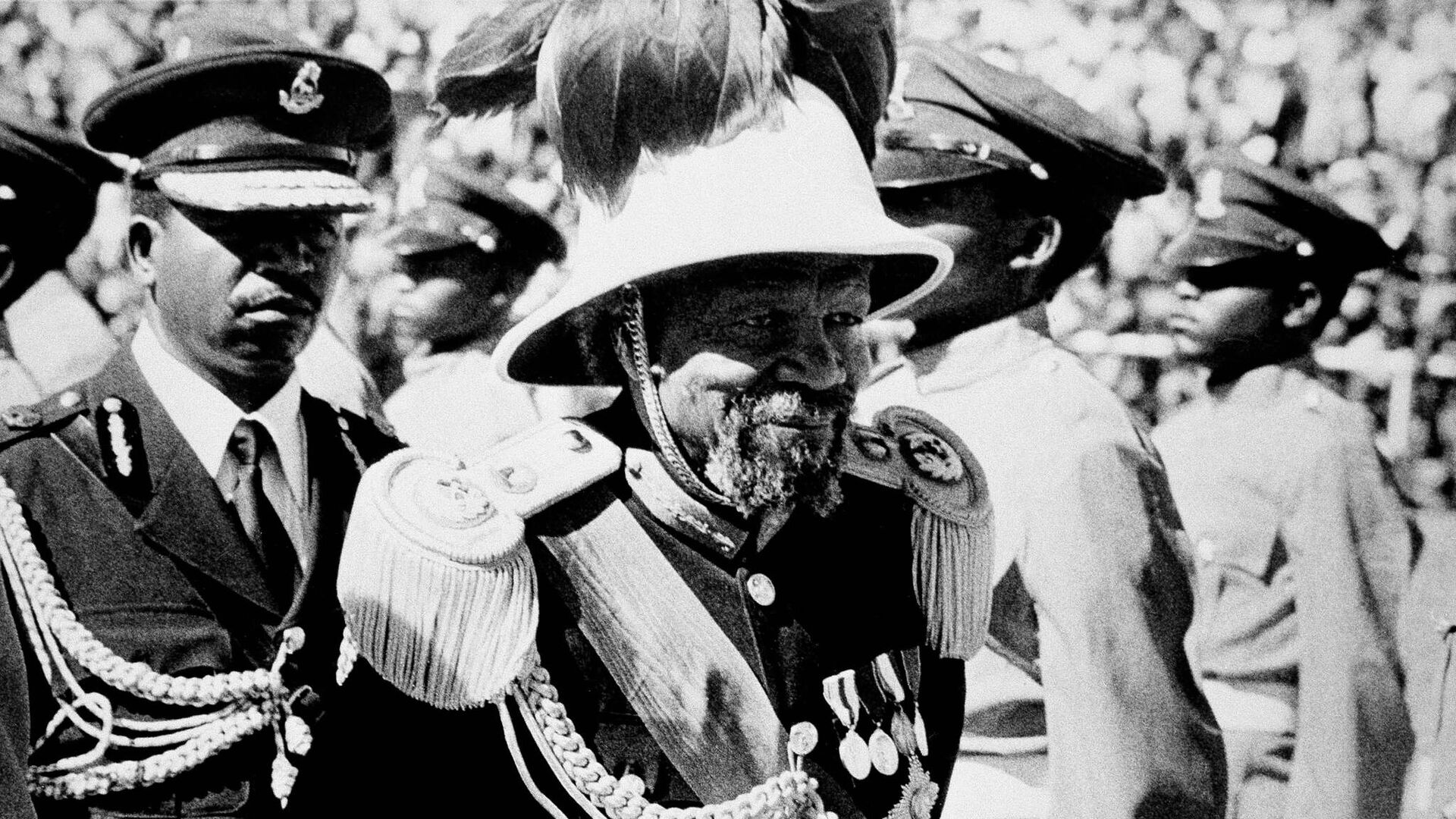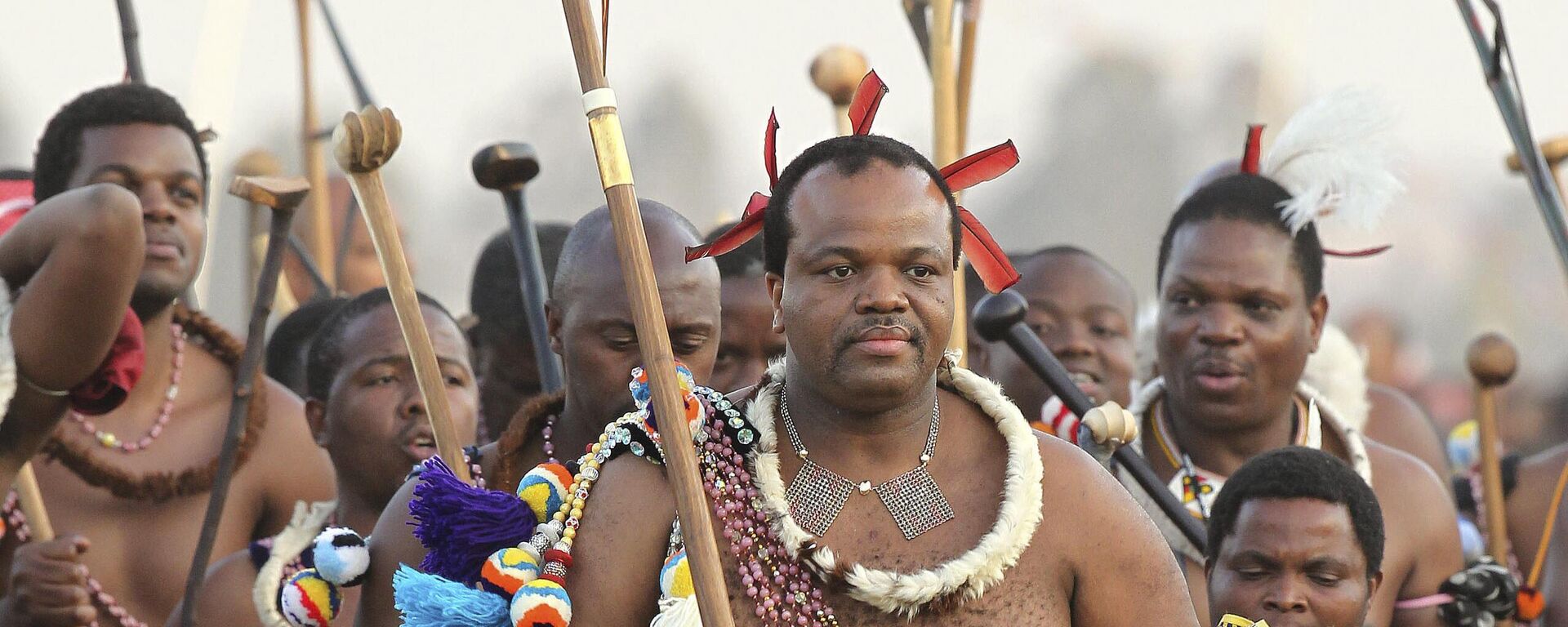https://en.sputniknews.africa/20230722/father-of-independence--and-of-210-children-swazi-king-sobhuza-iis-124th-birthday-1060696242.html
Father of Independence – and of 210 Children: Swazi King Sobhuza II's 124th Birthday
Father of Independence – and of 210 Children: Swazi King Sobhuza II's 124th Birthday
Sputnik Africa
Today, July 22, 2023, is the 124th birthday of the late King Sobhuza II of Eswatini, who played a key role in achieving the country's independence from Great... 22.07.2023, Sputnik Africa
2023-07-22T17:47+0200
2023-07-22T17:47+0200
2024-04-25T10:22+0200
southern africa
eswatini (swaziland)
king mswati iii
independence
british colonialism
colonialism
features
history
https://cdn1.img.sputniknews.africa/img/07e7/07/16/1060698032_0:0:2048:1153_1920x0_80_0_0_b887060470bb446cea99afbe2a03769f.jpg
Imagine ruling a country for more than eight decades, witnessing its transition from colonialism to independence, and fathering hundreds of children with dozens of wives. Such was the extraordinary life of Swazi King Sobhuza II, the longest-reigning monarch in history.Born on July 22, 1899, at Zombodze Royal Residence near the Swazi village of Zombodze, Swaziland, King Sobhuza II ascended the throne at the age of four months following the death of his father, King Ngwane V.Sobhuza's grandmother Labotsibeni, assisted by her son Prince Malunge, led the Swazi nation as regent until the young monarch came of age in 1921, when he ascended the Swazi throne as direct ruler at the age of twenty-two.Sobhuza was educated in his native kingdom of Swaziland, as well as in neighboring South Africa and Great Britain, where he studied anthropology.Fight for IndependenceThe Swazi King was a visionary leader who sought to preserve and promote the culture and traditions of his country. He also fought for the restoration of the lands that had been taken by the British authorities in 1907. He led a delegation to London to formally request the return of the land to the Swazi people from the British King George V.He also took his case to the Judicial Committee of the Privy Council, a court of final appeal for some Commonwealth countries and British territories, but he was defeated by the terms of the Foreign Jurisdictions Act 1890. Despite these setbacks, Sobhuza II continued to exert his influence as the traditional head of the Swazi nation.Reign and LegacySobhuza II ruled with wisdom and compassion, using political and family alliances to hold the nation together. He had at least 70 wives and 210 children, tying all major families to his own clan, the Dlamini.Sobhuza II celebrated the diamond jubilee (60 years) of his direct reign in 1981, which was attended by Princess Margaret on behalf of Queen Elizabeth of England. He also celebrated his 83rd birthday in 1982, where he gave a speech with the theme: "Unity is Strength".Barely a month after his 83rd birthday, the Swazi Monarch passed away on August 21 at Lobzilla Palace near Mbabane. Remarkably, his reign would last an astonishing 82 years and 254 days, the longest precisely dated monarchical reign on record and the world's longest documented reign of any ruler since antiquity.SuccessionHe was succeeded by Mswati III, his young son by his youngest wife Inkhosikati Ntfombi Tfwala. Mswati III was crowned in 1986 at the age of 18, making him the youngest reigning monarch in the world at the time.Today, Eswatini honors the legacy of King Sobhuza II with a public holiday and various celebrations. King Sobhuza II Memorial Park in Lobamba is a museum showcasing the late monarch's life and impact on the kingdom's history.The memorial park also features a statue of Sobhuza II and his 1959 Buick LeSabre car, which he used for official occasions. The park is a special encounter with the history and culture of Eswatini.
https://en.sputniknews.africa/20230419/breaking-with-colonial-past-eswatini-marks-fifth-anniversary-since-name-change-1058700258.html
southern africa
eswatini (swaziland)
Sputnik Africa
feedback@sputniknews.com
+74956456601
MIA „Rossiya Segodnya“
2023
Muhammad Nooh Osman
https://cdn1.img.sputniknews.africa/img/07e7/04/0a/1058467512_0:0:1280:1280_100x100_80_0_0_ec723833bcbfcaed2e21952965ad99e4.jpg
Muhammad Nooh Osman
https://cdn1.img.sputniknews.africa/img/07e7/04/0a/1058467512_0:0:1280:1280_100x100_80_0_0_ec723833bcbfcaed2e21952965ad99e4.jpg
News
en_EN
Sputnik Africa
feedback@sputniknews.com
+74956456601
MIA „Rossiya Segodnya“
Sputnik Africa
feedback@sputniknews.com
+74956456601
MIA „Rossiya Segodnya“
Muhammad Nooh Osman
https://cdn1.img.sputniknews.africa/img/07e7/04/0a/1058467512_0:0:1280:1280_100x100_80_0_0_ec723833bcbfcaed2e21952965ad99e4.jpg
southern africa, eswatini (swaziland), king mswati iii, independence, british colonialism, colonialism, history
southern africa, eswatini (swaziland), king mswati iii, independence, british colonialism, colonialism, history
Father of Independence – and of 210 Children: Swazi King Sobhuza II's 124th Birthday
17:47 22.07.2023 (Updated: 10:22 25.04.2024) Muhammad Nooh Osman
Writer/Editor
Today, July 22, 2023, is the 124th birthday of the late King Sobhuza II of Eswatini, who played a key role in achieving the country's independence from Great Britain in 1968. Sobhuza II was the 'Ngwenyama" (Lion) of Swaziland, now the Kingdom of Eswatini, for nearly 83 years.
Imagine ruling a country for more than eight decades, witnessing its transition from colonialism to independence, and fathering hundreds of children with dozens of wives. Such was the extraordinary life of Swazi King Sobhuza II, the longest-reigning monarch in history.
Born on July 22, 1899, at Zombodze Royal Residence near the Swazi village of Zombodze,
Swaziland, King Sobhuza II ascended the throne at the age of four months following the death of his father, King Ngwane V.
Sobhuza's grandmother Labotsibeni, assisted by her son Prince Malunge, led the Swazi nation as regent until the young monarch came of age in 1921, when he ascended the Swazi throne as direct ruler at the age of twenty-two.
Sobhuza was educated in his native kingdom of Swaziland, as well as in neighboring South Africa and Great Britain, where he studied anthropology.
The Swazi King was a visionary leader who sought to preserve and promote the culture and traditions of his country. He also fought for the restoration of the lands that had been taken by the British authorities in 1907. He led a delegation to London to formally request the return of the land to the Swazi people from the British King George V.
He also took his case to the Judicial Committee of the Privy Council, a court of final appeal for some Commonwealth countries and British territories, but he was defeated by the terms of the Foreign Jurisdictions Act 1890. Despite these setbacks, Sobhuza II continued to
exert his influence as the traditional head of the Swazi nation.
Finally, in 1967, Sobhuza II was acknowledged as King by the British, and Swaziland achieved independence in 1968.
Sobhuza II ruled with wisdom and compassion, using political and family alliances to hold the nation together. He had at least 70 wives and 210 children, tying all major families to his own clan, the Dlamini.
It's worth noting that the late king of the Zulu nation of South Africa, Goodwill Zwelithini kaBhekuzulu, was one of Sobhuza's sons-in-law. He was married to the Swazi king's daughter, Princess Mantfombi Dlamini, the mother of the current Zulu king, Misuzulu kaZwelithini.
Sobhuza II celebrated the diamond jubilee (60 years) of his
direct reign in 1981, which was attended by Princess Margaret on behalf of Queen Elizabeth of England. He also celebrated his 83rd birthday in 1982, where he gave a speech with the theme: "Unity is Strength".
Barely a month after his 83rd birthday, the Swazi Monarch passed away on August 21 at Lobzilla Palace near Mbabane.
Remarkably, his reign would last an astonishing 82 years and 254 days, the longest precisely dated monarchical reign on record and the world's longest documented reign of any ruler since antiquity.
He was
succeeded by Mswati III, his young son by his youngest wife Inkhosikati Ntfombi Tfwala. Mswati III was crowned in 1986 at the age of 18, making him
the youngest reigning monarch in the world at the time.
Today, Eswatini honors the legacy of King Sobhuza II with a public holiday and various celebrations. King Sobhuza II Memorial Park in Lobamba is a museum showcasing the late monarch's life and impact on the kingdom's history.
The memorial park also features a statue of Sobhuza II and his 1959 Buick LeSabre car, which he used for official occasions. The park is a special encounter with the history and culture of Eswatini.



